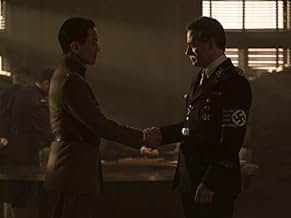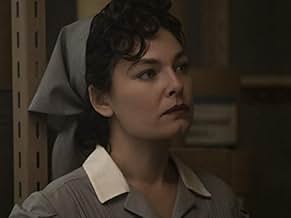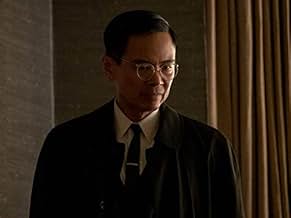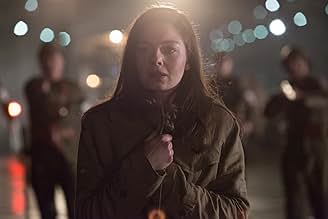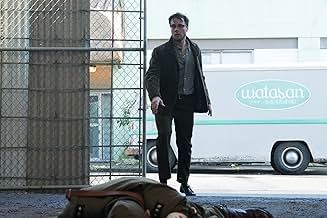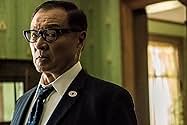In a dystopian America dominated by Nazi Germany and Imperial Japan, a young woman discovers a mysterious film that may hold the key to toppling the totalitarian regimes.In a dystopian America dominated by Nazi Germany and Imperial Japan, a young woman discovers a mysterious film that may hold the key to toppling the totalitarian regimes.In a dystopian America dominated by Nazi Germany and Imperial Japan, a young woman discovers a mysterious film that may hold the key to toppling the totalitarian regimes.
- Won 2 Primetime Emmys
- 10 wins & 57 nominations total
Browse episodes
Summary
Reviewers say 'The Man in the High Castle' is lauded for its intriguing alternate history concept, intricate characters, and meticulous world-building. The show's production design, cinematography, and detail-oriented approach are often commended. However, it faces criticism for pacing problems, especially in early seasons, and the addition of new characters deemed unnecessary or underdeveloped. The sci-fi elements, including alternate reality films, are both praised for their intrigue and faulted for their ambiguity. Some viewers are disappointed with character arcs and the direction of later seasons. Despite these issues, the series is widely seen as a visually captivating and intellectually stimulating journey through a grim alternate history.
Featured reviews
(Updated after Season 4).
It is the year 1962. Having lost World War 2, the United States is now occupied by Germany and Japan. Germany occupies the eastern states and Japan the western, with the Neutral Zone in between. When her sister is killed by the Japanese, Juliana Crain is sucked into the covert, dangerous world of the American Resistance. Opposing her and her comrades are the most ruthless forces the Nazis and Japanese have to offer, lead by Obergruppenfuhrer John Smith of the SS and Chief Inspector Kido of the Kempeitai. The Resistance's greatest hope appears to lie in films which show an alternate reality, a world where the US and its allies won WW2. While largely viewed as propaganda, these films could be more than that. At the centre of the manufacture and distribution of these films is one man, a figurehead in the Resistance: The Man in the High Castle.
Great, but not consistently so. Based on a novel by Philip K Dick (writer of the novels and short stories on which movies such as Blade Runner, Minority Report, A Scanner Darkly, Total Recall and Paycheck were based) and produced by Ridley Scott, the series had massive potential and initially lives up to it.
The central plot, an alternate history where the US loses WW2 and is occupied by the Germans and Japanese, is a very intriguing one and is very well done. The events that took place to reach the alternative reality and how the world and society now look and function all make sense. As a student of history, especially military history, I kept expecting something to not add up, or not fit in with history's possible paths, but it all fits in perfectly.
It became an enjoyable intellectual exercise for me, figuring out when the alternate history started deviating from the actual, and the events that took place, and didn't take place, for this to happen. As far as I can tell, the earliest deviation is in Dec 1941-Feb 1942 when the Japanese manage to invade and occupy Hawaii.
This alternate world provides some great plot developments and backgrounds for many intrigues: the American Resistance vs the Japanese and Germans; the friction between the Germans and Japanese and how they try to undermine each other, even potentially destroy each other, all while carrying on like loyal allies; the factional in-fighting within the Nazi Party and the Roman-style politics involved.
All the series needed was solid performances and no superfluous or hole-filled sub-plots and it would have been perfect. Easy enough to ask, right?
Yes, but alas, difficult to achieve.
After creating this great platform for drama and reimagining history and society, sub-plots are certainly not free of holes or contrivances. It is usually small things, but they are enough to undermine the credibility of the plot, e.g. 50 Japanese soldiers barge into a club to catch a fugitive, they all go in the front door, leaving other exits unguarded, fugitive escapes through the back door; man meets Yakuza boss, he's carrying a gun but henchmen don't frisk him, gun gets him out of a sticky situation.
Then there's the sci fi aspect involving the films. Admittedly, this is written by Philip K Dick so you should expect a sci fi angle, but I would have preferred the series to just concentrate on alternate history, and the drama stemming from that, rather than introduce the sci fi drama. It just seemed like an unnecessary add-on and a distraction.
Furthermore, performances are far from consistently solid. Alexa Davalos imbues Julianna Crain with a wimpy, anaemic, unengaging quality, far from what you'd want the main "good guy" in a series to be. Luke Kleintank makes Joe Blake boring and unlikeable. DJ Qualls is one of the more irritating actors in showbiz and generally the harbinger of a C-grade movie. Here he lives up to that reputation. I kept hoping the Japanese would shoot him and put me out of my misery. Cary-Hiroyuki Tagawa is so boring as Trade Minister Tagomi it feels like every scene he is in takes an hour. Admittedly his character is drawn that way too, so some fault has to lie with the writers.
On the flipside there is Rufus Sewell as John Smith. Sewell's performance stands like a mountain among knolls: he absolutely dominates the series, putting in the perfect performance as the ice cold, calculating, ruthless yet family-orientated Nazi. If it wasn't for Sewell and how well-constructed Smith's character was, the series would have fallen apart.
After three seasons it was all set up for a great finale. While the initial intrigue had worn off and the plot started to get more and more padded (largely by the multiple universes stuff) it still had heaps of potential. In addition, achieving the potential didn't seem difficult: explore the intrigues between Japan and Germany, with the resistance adding a bit of spice, and build up to a massive all-in conflict.
Sadly, however, Season 4 turns out to be easily the worst season of the series. The intrigues and battles are few and far between. The multiple universes aspect gets centre stage and there are heaps of sub-plots which don't really add anything. The ending is rather tame and unsatisfying.
Ditch the multiple universes, concentrate on the alternate history and the Germany vs Japan vs resistance struggle (throughout the series), create some engaging "good guy" characters, played by good actors and actresses, and you'll have a masterpiece. Instead, while still on the whole very good, this feels like a massive missed opportunity.
It is the year 1962. Having lost World War 2, the United States is now occupied by Germany and Japan. Germany occupies the eastern states and Japan the western, with the Neutral Zone in between. When her sister is killed by the Japanese, Juliana Crain is sucked into the covert, dangerous world of the American Resistance. Opposing her and her comrades are the most ruthless forces the Nazis and Japanese have to offer, lead by Obergruppenfuhrer John Smith of the SS and Chief Inspector Kido of the Kempeitai. The Resistance's greatest hope appears to lie in films which show an alternate reality, a world where the US and its allies won WW2. While largely viewed as propaganda, these films could be more than that. At the centre of the manufacture and distribution of these films is one man, a figurehead in the Resistance: The Man in the High Castle.
Great, but not consistently so. Based on a novel by Philip K Dick (writer of the novels and short stories on which movies such as Blade Runner, Minority Report, A Scanner Darkly, Total Recall and Paycheck were based) and produced by Ridley Scott, the series had massive potential and initially lives up to it.
The central plot, an alternate history where the US loses WW2 and is occupied by the Germans and Japanese, is a very intriguing one and is very well done. The events that took place to reach the alternative reality and how the world and society now look and function all make sense. As a student of history, especially military history, I kept expecting something to not add up, or not fit in with history's possible paths, but it all fits in perfectly.
It became an enjoyable intellectual exercise for me, figuring out when the alternate history started deviating from the actual, and the events that took place, and didn't take place, for this to happen. As far as I can tell, the earliest deviation is in Dec 1941-Feb 1942 when the Japanese manage to invade and occupy Hawaii.
This alternate world provides some great plot developments and backgrounds for many intrigues: the American Resistance vs the Japanese and Germans; the friction between the Germans and Japanese and how they try to undermine each other, even potentially destroy each other, all while carrying on like loyal allies; the factional in-fighting within the Nazi Party and the Roman-style politics involved.
All the series needed was solid performances and no superfluous or hole-filled sub-plots and it would have been perfect. Easy enough to ask, right?
Yes, but alas, difficult to achieve.
After creating this great platform for drama and reimagining history and society, sub-plots are certainly not free of holes or contrivances. It is usually small things, but they are enough to undermine the credibility of the plot, e.g. 50 Japanese soldiers barge into a club to catch a fugitive, they all go in the front door, leaving other exits unguarded, fugitive escapes through the back door; man meets Yakuza boss, he's carrying a gun but henchmen don't frisk him, gun gets him out of a sticky situation.
Then there's the sci fi aspect involving the films. Admittedly, this is written by Philip K Dick so you should expect a sci fi angle, but I would have preferred the series to just concentrate on alternate history, and the drama stemming from that, rather than introduce the sci fi drama. It just seemed like an unnecessary add-on and a distraction.
Furthermore, performances are far from consistently solid. Alexa Davalos imbues Julianna Crain with a wimpy, anaemic, unengaging quality, far from what you'd want the main "good guy" in a series to be. Luke Kleintank makes Joe Blake boring and unlikeable. DJ Qualls is one of the more irritating actors in showbiz and generally the harbinger of a C-grade movie. Here he lives up to that reputation. I kept hoping the Japanese would shoot him and put me out of my misery. Cary-Hiroyuki Tagawa is so boring as Trade Minister Tagomi it feels like every scene he is in takes an hour. Admittedly his character is drawn that way too, so some fault has to lie with the writers.
On the flipside there is Rufus Sewell as John Smith. Sewell's performance stands like a mountain among knolls: he absolutely dominates the series, putting in the perfect performance as the ice cold, calculating, ruthless yet family-orientated Nazi. If it wasn't for Sewell and how well-constructed Smith's character was, the series would have fallen apart.
After three seasons it was all set up for a great finale. While the initial intrigue had worn off and the plot started to get more and more padded (largely by the multiple universes stuff) it still had heaps of potential. In addition, achieving the potential didn't seem difficult: explore the intrigues between Japan and Germany, with the resistance adding a bit of spice, and build up to a massive all-in conflict.
Sadly, however, Season 4 turns out to be easily the worst season of the series. The intrigues and battles are few and far between. The multiple universes aspect gets centre stage and there are heaps of sub-plots which don't really add anything. The ending is rather tame and unsatisfying.
Ditch the multiple universes, concentrate on the alternate history and the Germany vs Japan vs resistance struggle (throughout the series), create some engaging "good guy" characters, played by good actors and actresses, and you'll have a masterpiece. Instead, while still on the whole very good, this feels like a massive missed opportunity.
I'm a TV show lover, but never! ever! has a series made me want to write a review. It was a cold Sunday evening... I was waiting for Sunday night football around 645pm. I decided to squeeze in the pilot. Needless to say, 7 episodes later I was still watching. The story line is incredible. The acting is great. The emotions that it brought out of me was real and raw. It made me appreciate and think differently about the word/idea/concept that we all throw around "FREEDOM." Yes, it's fictional, and yes it's just a TV-show, but boy! they hit on something, at least in me. I'm beyond impress! Monday morning, coffee to the rescue!
I love the first 2 seasons. The plot was incredibly shocking. The actor Rufus Sewell (John Smith) is definitely the star of the series. A fascinating character that talks to you with his eyes. The first runner up is of course Joel de la Fuente as Inspector Kido. On the other hand, the weakness of the series is the character of Juliana Crain played by Alexa Davalos. She was ok in Season 1 but her character turned to annoying upto Season 4.
Despite some unnecessary scenes in Season 3 made just to satisfy the diversity dilemma of the West, I give this show 9 Stars for the great and unbelievable moments it provided.
Despite some unnecessary scenes in Season 3 made just to satisfy the diversity dilemma of the West, I give this show 9 Stars for the great and unbelievable moments it provided.
An immaculate, terrifying alternate history that is accurate down to the buttons. I love period pieces, and this scary projection of a post WW2 hegemony ruled by the Japanese and German empires certainly fits the bill. Every costume, building, landscape, vehicle, street and interior room is accurate down to the woodwork and spoons - such a delight to watch.
It's interesting in itself to see the crushed American psyche in the face of utter defeat, humiliation and occupation by mortal enemies. This alternate history makes the American century seem a fantasy, certainly it took tremendous courage to make this series.
It's also nerve wracking watching the razor thin tightrope walked by the various protagonists on the winning side, as they try to navigate the internal dangers of their own ruthless regimes.
The suffering of the common Americans reminds me of the brutal oppression we have witnessed around the world by autocratic regimes over the last 100 years - that in itself is a rich irony.
The series is also a study on what it takes to bring down oppressive empires. Each of our dear protagonists - Joe, Juliana and Frank - are guided by their positive moralities on a destiny of greatness. It's particularly interesting to see how the entire arc of history can be rewritten by a single good or bad deed, by a single done or undone action.
The machinations of Obergruppenfuhrer Smith, Trade Minister Togumi and Chief Inspector Kodi-Tai are particularly interesting. Both men stand on mountains of corpses built by their empires, and out of a deep sense of duty and honor, they maneuver to preserve their nations from further bloodshed and destruction, working always in the shadows.
The searing images of enflamed Americans chanting Blood and soil do not seem so distant from our current epoque, nor do they seem alien and impossible. We are indeed witnessing history, with so-called freedom loving Americans flirting with fascism.
It is heartening to see the universe is in balance, with the terrible personal price paid by men of previous principle, who sold their soul for survival at all costs. The arc of history does indeed bend toward justice.
Ultimately this is a series about the Power of ideas to revive a forgotten dream, to restore hope and courage to the absolutely downtrodden and conquered. Symbolism is the most powerful motif, present endlessly across all domains of the various powers. Images and the ideas attached to them move people to action.
It is quite interesting to see the underlying Metaphysics and laws of the universe being respected in this multiverse spanning series. As a fan of Fringe and other SciFi benders, it is nice to see a return to alternate timelines and realities, and how they interplay with each other according to 'rules'.
I appreciate the 4th season in particular as it highlights the tremendous racial atrocities that these regimes are capable of, and the personal horrors of the victims. Oftentimes minorities are under-represented in such shows, and it is welcome to see the producers avoid that mistake. The humanization of minority victims was detailed and appreciated. The 4th season also does a great job of reinforcing the belief that we are who we are, even in the multiverse.
There were some loose ends left that did not completely tie up the threads, especially around the multiverse. I guess I need to watch and read some analysis from smarter folks. It's normal that cerebral series like this leave some ideas for interpretation.
The series finale was amazing, Hollywood level production values, astounding special effects. I am truly impressed by Amazon studios. Their offerings give HBO a run for their money.
The pilot episode was exceptional. It held my attention and made me believe in such an alternate history.
I have read the book, and although it is different, it is an incredible adaptation. If the book was turned into a show without any edits, it would be far too complicated and very hard to enjoy (although the book is incredible).
The acting, story, and visuals are spot on and only intensified what I had imagined when I read the book. When I first read the book, I had hoped for a movie to be made from it, but a show will be a much better pace for such an though-provoking and intelligent story.
I want more episodes!!
I have read the book, and although it is different, it is an incredible adaptation. If the book was turned into a show without any edits, it would be far too complicated and very hard to enjoy (although the book is incredible).
The acting, story, and visuals are spot on and only intensified what I had imagined when I read the book. When I first read the book, I had hoped for a movie to be made from it, but a show will be a much better pace for such an though-provoking and intelligent story.
I want more episodes!!
Did you know
- TriviaExtensive research was done for the cultures, particularly areas such as costuming, technology, and music, to develop an alternate world which merges aspects of WWII Nazi and Imperial Japanese cultures with the cultural progress of mid-1950s America. Although the series is set in 1962, the use of the 1950s for many touchstones suggests the cultural stagnation that would have occurred under totalitarian occupation.
- GoofsThe Japanese sign in the aikido dojo says Habu Yakkyoku in Japanese which means Lance-Head Snake Pharmacy.
- Quotes
Joe Blake: [noticing ashes falling like snowflakes] What is that?
Nazi Police Officer: Oh, that's the hospital.
Joe Blake: The hospital?
Nazi Police Officer: Yeah, Tuesdays, they burn cripples, the terminally ill. Drag on the state.
- Crazy creditsThe copyright warning at the end of every episode is written in German and Japanese as well as English.
- ConnectionsFeatured in WatchMojo: Top 10 Philip K. Dick Adaptations (2016)
Details
- Release date
- Countries of origin
- Official sites
- Languages
- Also known as
- The Man in the High Castle
- Filming locations
- Production companies
- See more company credits at IMDbPro
Contribute to this page
Suggest an edit or add missing content







